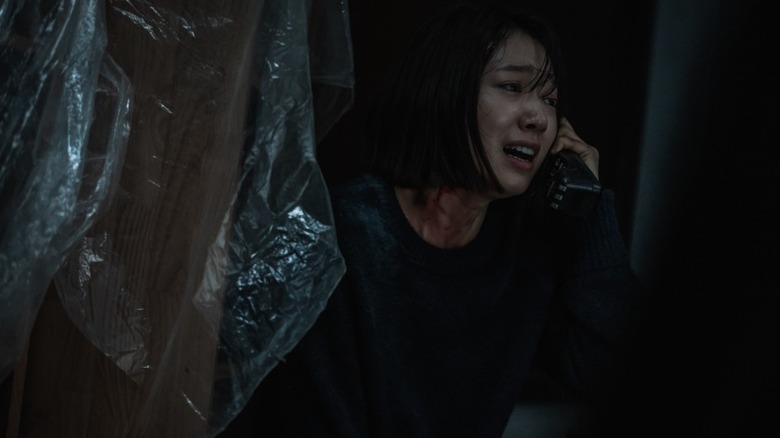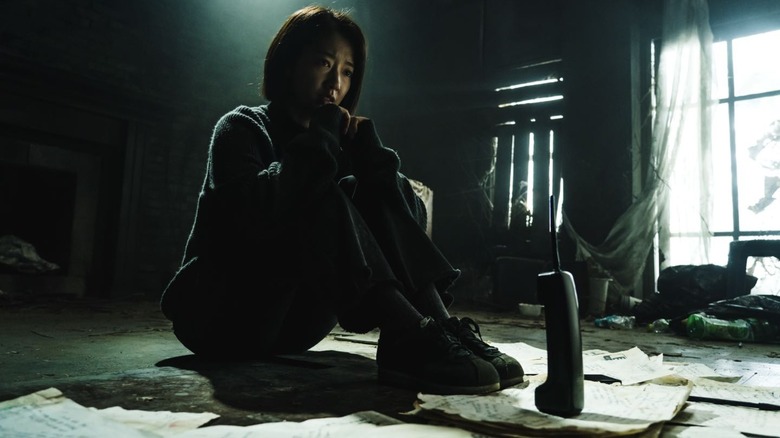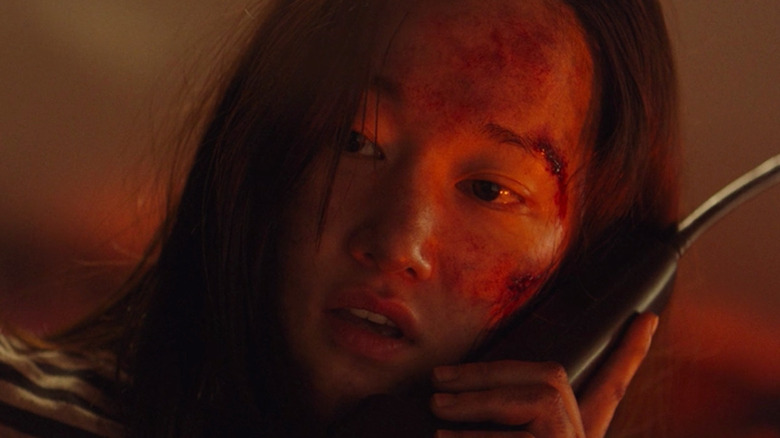The Call Is The Latest Nightmarish Korean Thriller Exploding On Netflix
Have you ever met someone, struck up a seeming friendship, and then discovered this person was not who you believed they were? It's a terrifying situation and one that the South-Korean thriller "The Call" (directed by Lee Chung-hyun) presents with a supernatural twist.
In 2019, Kim Seo-yen (Park Shin-hye) visits her childhood home to check in on her ill mother Eun-ae (Kim Sung-ryung), and her late father's grave. While there, she discovers the house's cordless phone connects to an unusual recipient: Oh Young-sook (Jeon Jong-seo), the girl who lived in the house before her. Separated by 20 years, the two women decide to take advantage of their new relationship: Young-sook prevents Seo-yen's father from dying in a house fire, while Seo-yen gives Young-sook foreknowledge to escape death at her abusive mother's hands.
Unfortunately, while Young-sook survives, she comes away with a taste for blood. As familiar faces disappear as if they never existed, Seo-yen realizes she has to prevent her life from coming undone 20 years in the past. The only way to do so? Obey Young-sook. This is what makes the film scary; Seo-yen is being blackmailed by someone she's utterly powerless to fight against.
"The Call," released on Netflix in 2020 after COVID-19 prevented theatrical exhibition, is a remake of the 2011 film "The Caller." The premise might also remind one of Makoto Shinkai's acclaimed anime "Your Name," where two Japanese teenagers, a boy, and a girl, start swapping bodies and must find ways to communicate, and Scott Derrickson's since-released horror film/Joe Hill adaptation "The Black Phone," about an abducted boy who finds a phone that can communicate with the ghosts of his kidnapper's past victims.
How does "The Call" measure up? Well for one thing, fans have been complaining about the film giving them nightmares.
A time travel thriller
"The Call" shares DNA with a haunted house story. A house is a home to not just those who live in it but the memories they make in it. In ghost stories, a face from the past is what haunts the lead. In "The Call," it's the past itself that does the haunting. Lee and his director of photography Jo Young-jik use a color contrast to separate the past and present; the 1999 timeline has a yellow tint while the 2019 scenes employ cooler tones from blue to misty white. This contrast helps to make the climax — set in the house, but with frequent cross-cutting between past and present — legible.
Speaking of, the movie smartly doesn't try to explain the cause of the time travel gimmick because doing so would be distracting in a thriller like this. Timeline alterations in the film do operate under particular mechanics, but there's never any exposition; you work out what happens as the characters do. Only Seo-yen and Young-sook are conscious of the changes — possibly because they're the only two who've communicated across temporal lines. The changes also happen gradually, with objects and people not just vanishing but outright cracking apart.
This leads to the film's grisliest scene; Young-sook pours boiling water on the young Seo-yen, causing her adult self to scream in 2019 as the burn scar forms slowly on her side. The effect reminded me of a disturbing scene in Rian Johnson's "Looper," where a character's body parts are surgically removed and they vanish one by one from his future self.
Tell a story, not a gimmick
Jeon's most famous role remains "Burning," another South-Korean thriller that blurs the line into horror (this one was directed by Lee Chang-dong). In "Burning," she plays Shin Hae-mi, the love interest of the lead Jong-su (Yoo Ah-in). Hae-mi vanishes halfway through the movie and may or may not have been murdered. Hae-mi is purposefully a hollow character because she's being interpreted through the eyes of Jong-su.
Initially, Jeon seems to be doing another rendition of this, playing the innocent girl who needs to be rescued. Then Young-sook transforms, becoming a cackling villainess who relishes evil. I'll admit this was too swift of a 180 twist for me, but it does track with the repression Young-sook experienced under her religious mother. Now that she's finally free, she's going overboard satisfying her grudge against the world.
This leads us to the story's theme; "The Call" is a story about mothers and daughters. While Young-sook destroys her mother, Seo-yen and Eun-ae slowly repair their relationship. Seo-yen initially resents her mother and misses her father; her story is about her realizing that her mother is the only parent she has left and that she must cherish her. That is, until the very last minute of the film. The film discards its earned catharsis for a different, cheap twist. I feel the film became so caught up in its gimmick it forgot what its story was actually about.
"The Call" is streaming on Netflix.


